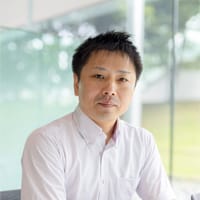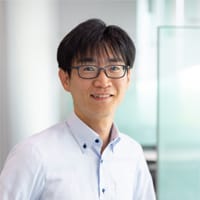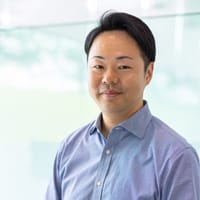Journey
Overseas Assignments
Canon's Intellectual Property (IP) Division prioritizes the cultivation of personnel with an international sense of balance and a broad perspective. As part of this effort, some employees are assigned to work at Canon's overseas offices (in the United States, China, the United Kingdom, France, the Netherlands, Singapore, Australia, etc.). Such individuals with experiences working abroad contribute to strengthening Canon IP's global organizational capabilities.

Ryuta Hirayama (Joined Canon in 1998)
- Nickname: Ryu
- Assignment Location: Canon Europe, UK (From March 2015 for 5 years and 8 months)
- Impressive event during Assignment: Became known as the "Trouble King" after visiting 27 countries.
Masahiko Kinomoto (Joined Canon in 2004)
- Nickname: Max
- Assignment Location: Canon USA, USA (From March 2015 for 4 years)
- Impressive event during Assignment: Shortly after arrival, his newborn son developed a fever of 40 degrees Celsius, leading to a frantic search for a hospital.


Takahiro Saito (Joined Canon in 2015)
- Nickname: Taka
- Assignment Location: Canon Australia (From November 2020 for 2 years and 2 months)
- Impressive event during Assignment: Impressed by encountering wild wombats in Tasmania!
Tell us about the duties involved with overseas assignments.
R: The nature of the work varies depending on the overseas assignment. It also differs based on whether the assignment is with a research and development company or a regional sales company, as well as the region of the assignment. What can be said about any assignment is that the scope of work expands significantly, and you have the opportunity to directly engage with local development and business departments, as well as numerous government agencies and other companies, which you may have less exposure to in Japan. You experience the unique aspect of working abroad, handling things in accordance with local customs. Personally, I was assigned to the UK, where I played a role in establishing the very first intellectual property organization led by a local individual in a regional sales company, working hand in hand with a British boss to develop the intellectual property organization. Now, it has become an indispensable part of the Canon IP Group.
M: At Canon USA, I partnered with US intellectual property specialists to support invention discovery and patent rights. I visited the US Patent and Trademark Office multiple times, underwent countless examiner interviews, gaining confidence along the way, and developed a deep understanding of how to navigate interactions with US examiners. Additionally, while I specialized in software in Japan, at my assignment location, I was responsible for all technology fields developed by Canon, including fields such as optics and chemistry, which were new territories for me, broadening my technical expertise significantly.
T:At Canon Australia, I worked as a part of a team local engineers on a project related to international standardization. In the project, I gained experience in overseas management by budgeting, managing achievements, and hiring new members according to local practices.
- It seems like employees experience completely different tasks depending on their assignment location.

Can you tell us about any surprises or challenges you faced during your overseas assignments?
R:The biggest challenge for me was dealing with unfamiliar tasks while using English. For instance, I had to negotiate for securing a budget for the IP division, which was something I had never done before, and I had to do it in English under local rules. This felt significantly more challenging than conducting patent litigation and managing which I did back in Japan just before my assignment. I was also shocked by the cultural differences. Adapting to an environment where there are fewer approval steps, decisions are made incredibly fast, and people are unafraid to express differing opinions was tough for me. However, after overcoming these challenges and gaining recognition from the local IP team, I began to enjoy my life there, and it felt worth all the effort.
T/M:We were also surprised by the difference in the sense of speed and struggled with English.
T:Regarding the difference in the sense of speed, for example, while talking to local engineers, I would get sudden requests where they would say something like, "We got good experimental results yesterday, so we want to file another application by tomorrow." Even though I thought some of the requests might be impossible, I somehow managed to handle them, and I realized that there was nothing I couldn’t handle and remember feeling like I had stepped up to a higher level. It was also eye opening to realize that my previous work pace was based on Japanese rules and approval steps.
M:The biggest struggle for me with English was in private matters, especially related to doctor visits and medication. Since these involve life-and-death situations, I wanted to convey information in detail rather than broadly, but it was quite challenging. While my colleagues at work would patiently listen even if my English wasn't perfect, people outside of work would not pay that much attention to me. Realizing that business English alone wouldn't suffice, I devoted time to improving my everyday conversational English. This effort paid off at work, and in the latter half of my assignment, I gained confidence in being able to communicate anything work-related effectively. I also rarely encountered further difficulties in everyday conversations.
Have you grown through your overseas assignments?
T: I think I have developed a more global perspective. When chatting with local engineers about daily news, I noticed that even the same news is viewed and interpreted very differently by them, and they always have their own opinions. Being exposed to perspectives different from my own was a positive experience for me. Especially being in an environment where what is considered "normal" in Japan is “not normal," yet society still functions smoothly, allowed me to realize these differences in thinking. Since returning to Japan, I am careful not to be constrained by what I might assume to be "common sense" in Japan.
R: Indeed, understanding different perspectives and values is the first step in an overseas assignment, and I think it is very important.
M:During my assignment, I often heard people say, "That approach doesn’t work in the US.". Japanese staff tend to work according to rules set by the head office even when they are on an assignment, but overseas staff work based on local rules, which makes Japanese methods seem illogical or inefficient. Since bridging Japan and overseas is an important role of expatriates, I made sure to understand the underlying principles of both sides and adjust accordingly. This experience helped me develop the ability to objectively understand both my position and the other party's, and reconcile different opinions. Now that I am in a managerial position, this skill has been very beneficial.
T: I feel the same way. It has improved my understanding for diversity.
R: In addition to the ability to handle diversity, I believe I have also developed a sense of balance and the ability to grasp the big picture. During my time abroad, I encountered a wide variety of perspectives and values, which was very stimulating. However, these differences often led to conflicts. To resolve these conflicts and reach meaningful conclusions, I learned the importance of being able to naturally accept different values, seeing the big picture, and finding win-win points. The local IP team, including my British boss who always emphasized the "big picture," helped me grow, and I am still very grateful to them.

How did you spend your private time?
M:Since my assignment had a set duration, I felt it would be a waste not to go out, so I visited various scenic places. Surrounded by beautiful and majestic nature, I often felt how fleeting and small human existence is, and how short our lifespans are.

T: I also visited several beautiful places, but I enjoyed spending my free days without plans as well. Like the locals, I would leisurely have lunch at a café or relax in a large park or on the beach. The way time flowed on my days off was different from how it felt on Japanese holidays.
R:In the UK, it's all about pubs and BBQs. Drinking beer in the bright pub gardens at night was exceptional, and I even became a skilled lamb grill master. I also traveled to 27 countries in Europe, encountering countless troubles that strengthened my resolve. I discovered the wonderful food and nature of Europe, gaining a deep appreciation for its charm.
Lastly, how would you describe your overseas assignments in a few words?
R/M/T:"My world expanded!!"
R:I think this sums it up perfectly. By experiencing the vastness, fascination, and challenges of the world firsthand, your perspective changes. This change in perspective alters your actions and can lead to significant contributions to the organization. I hope that Canon's IP team members will continue to experience overseas assignments and grow into individuals who can help build an attractive IP organization.

